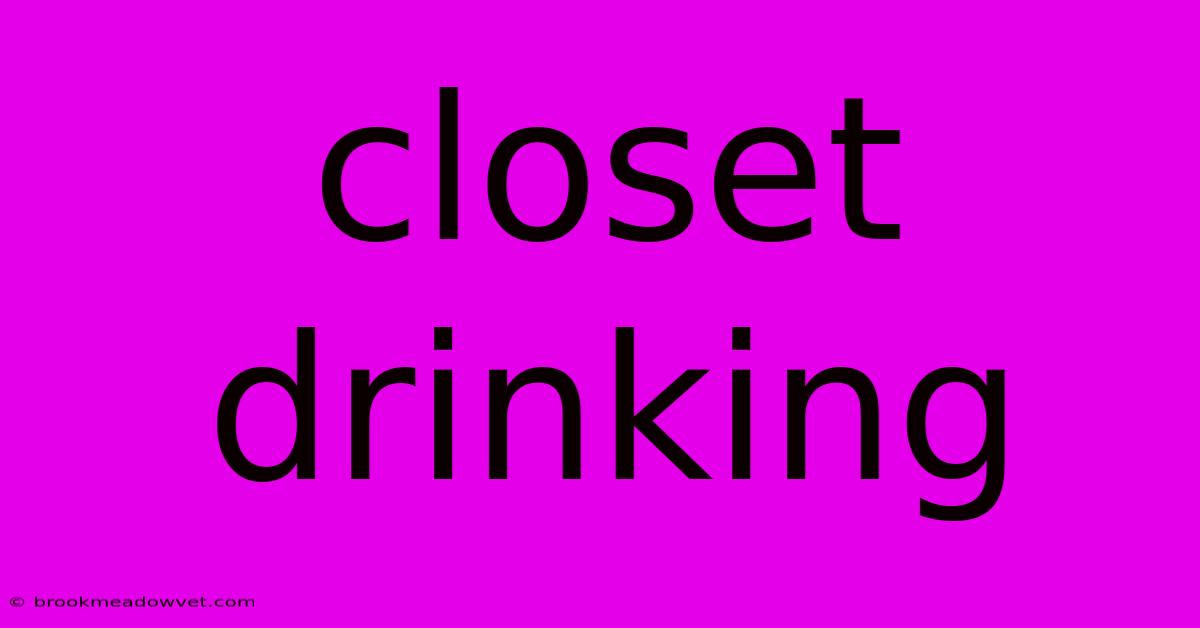Closet Drinking

Table of Contents
The Hidden Struggle: Understanding Closet Drinking
Alcoholism is a complex and often misunderstood disease. While many people picture the stereotypical image of a drunken individual stumbling around in public, the reality is far more nuanced. One of the most insidious forms of alcohol abuse is closet drinking, where individuals struggle with their dependence in secret.
What is Closet Drinking?
Closet drinking refers to the act of consuming alcohol in secret from family, friends, and coworkers. It's a behavior that can be incredibly isolating and damaging to both the individual and their relationships.
Here are some signs that someone may be a closet drinker:
- Hiding alcohol: Bottles disappearing, empty cans in unusual places, or constantly needing to "run to the store" for "something"
- Drinking alone: Preferring to be alone at certain times, especially in the evenings
- Sudden personality changes: Irritability, mood swings, or becoming withdrawn and secretive
- Unexplained absences: Making excuses for leaving work early or staying late
- Physical changes: Redness in the face, weight fluctuations, or smelling of alcohol
- Denial: Vigorously denying any issues with alcohol or dismissing concerns as "overreacting"
The Dangers of Closet Drinking
While it might seem like a way to "manage" alcohol use, closet drinking is actually incredibly dangerous.
- Physical health risks: Long-term alcohol abuse can lead to serious health problems such as liver disease, heart disease, and various cancers.
- Mental health issues: Closet drinking can contribute to anxiety, depression, and other mental health problems.
- Relationship breakdown: The secrecy and isolation can strain relationships with loved ones, leading to mistrust and communication issues.
- Legal consequences: Driving under the influence, violence, or other alcohol-related incidents can result in legal problems.
Breaking the Cycle: Help for Closet Drinkers
If you or someone you know is struggling with closet drinking, it's essential to seek help.
- Acknowledge the problem: The first step is to admit that there's an issue. This can be incredibly difficult, but it's the foundation for recovery.
- Find support: Reach out to a trusted friend, family member, or professional for support.
- Seek professional help: Alcoholics Anonymous (AA) and other support groups offer safe and confidential spaces for individuals to share their experiences and work towards recovery.
- Therapy: A therapist can help individuals understand the root causes of their drinking and develop healthier coping mechanisms.
Remember: Closet drinking is a serious problem, but it's not insurmountable. Help is available, and recovery is possible.
If you are struggling with alcohol abuse, please reach out for help. There are resources available to help you navigate this challenging journey.

Thank you for visiting our website wich cover about Closet Drinking. We hope the information provided has been useful to you. Feel free to contact us if you have any questions or need further assistance. See you next time and dont miss to bookmark.
Featured Posts
-
Dark Forest Green Living Room
Nov 06, 2024
-
Living Room Fandelier
Nov 06, 2024
-
Quigley Landscaping
Nov 06, 2024
-
Changing Gas Fireplace To Electric
Nov 06, 2024
-
Tile Flooring Bathroom Tiles
Nov 06, 2024

